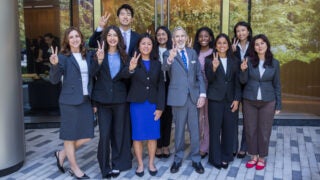Mobile devices used in human trafficking, USC Annenberg report reveals
Mobile phones and devices are now being used to traffic minors for commercial sex in the United States, and they are among numerous digital channels facilitating the exploitation of children, according to a new report from the Center on Communication Leadership & Policy (CCLP) at the USC Annenberg School for Communication and Journalism.
“The Rise of Mobile and the Diffusion of Technology-Facilitated Trafficking,” the latest CCLP report on the intersection of technology and human trafficking and the follow-up to last year’s “Human Trafficking Online,” draws from a series of firsthand interviews with law enforcement officials and an analysis of mobile phone data. The report urges policymakers, business leaders, law enforcement officials and social service providers to develop innovative solutions to technology-facilitated trafficking.
“Increasingly, the business of human trafficking is taking place online and over mobile phones,” said CCLP Research Director Mark Latonero. “Mobile devices allow traffickers to expand their criminal networks in new ways. At the same time, these technologies can be used to target traffickers, reach vulnerable communities and raise public awareness.”
Alec Ross, senior adviser for innovation in the office of Secretary of State Hillary Clinton, noted that “technology contributes to both the problems and solutions regarding human trafficking. This report is an important contribution to the field and should be widely read by those seeking to develop solutions to the evil of human trafficking.”
Ernie Allen, president and CEO of the International Centre for Missing and Exploited Children, said: “It is clear that human trafficking has moved from the streets to online — it is easier, less risky and more profitable. This report is at the cutting edge of efforts to harness new technologies to protect children and will enhance understanding worldwide.”
The CCLP report highlights the opportunity for private-sector technology companies and mobile carriers to work with the anti-trafficking community to develop meaningful solutions.
“Evidence-based research like this is vital in the fight against human trafficking because it will open the door to innovative new approaches to combat the problem that would never before have been possible,” said Samantha Doerr, public affairs manager for Microsoft’s Digital Crimes Unit.
Courtney Bowman, civil liberties engineer at Palantir Technologies, added: “This report … reminds us that technology is not developed in a vacuum [and] technologists [also] have a role to play in considering the social, cultural, legal and constitutional implications of their craft.”
The report’s recommendations include developing a comprehensive strategy to address human trafficking occurring on multiple digital platforms, including mobile; training law enforcement and social service providers; and encouraging public officials to place human trafficking high on their policymaking agendas.
“This report reflects our center’s commitment to the use of technology to improve society and breaks new ground in the area of human trafficking,” said Geoffrey Cowan, CCLP founder and director. “We look forward to continuing to work with a wide range of colleagues to find new ways for technology, and particularly mobile technology, to help, rather than to harm, society.”



